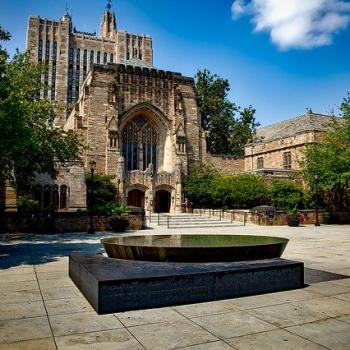 A few days ago, Pater Edmund Waldstein—a Cistercian monk based out of Austria, and editor of the Josias website principally responsible for the contemporary mainstreaming of integralism—circulated a particularly fascinating document on Twitter: a decidedly premodern outline for a Great Books-based liberal arts college curriculum, one offering a far deeper dive into theology and political philosophy than usually provided at the undergraduate level. (Give yourself a few minutes to peruse it; it’s interesting and thought-provoking stuff.)
A few days ago, Pater Edmund Waldstein—a Cistercian monk based out of Austria, and editor of the Josias website principally responsible for the contemporary mainstreaming of integralism—circulated a particularly fascinating document on Twitter: a decidedly premodern outline for a Great Books-based liberal arts college curriculum, one offering a far deeper dive into theology and political philosophy than usually provided at the undergraduate level. (Give yourself a few minutes to peruse it; it’s interesting and thought-provoking stuff.)
I’m not an educator myself, but as the beneficiary of a fairly comprehensive and theologically grounded liberal arts education, I consider myself at least a little bit qualified to comment on this proposal. For starters, the centrality of primary sources in Waldstein’s curriculum is commendable—I certainly won’t cry any tears over the lack of Pearson or Routledge textbooks. And a student who went through Waldstein’s proposed course of study would, no doubt, develop an uncommon competence in classical Western metaphysical and political thought. Indeed, they’d be very well equipped to be a medieval-style scholastic, someone capable of building out lengthy trains of reasoning from original philosophical premises toward fine-grained conclusions. The most impressive integrations of faith and reason stem from such efforts.
But what I found most surprising about Waldstein’s curriculum is the near-total absence of what’s typically called literature. I don’t even think this is a matter of Protestant parochialism—altogether absent from this meta-syllabus are a wide range of texts widely considered central to the traditional “canon,” such as Malory’s Le Morte d’Arthur, Cervantes’s Don Quixote, Chaucer’s Canterbury Tales, or anything from Shakespeare. The few examples of nonbiblical literature—Homer, Aeschylus, Sophocles, Euripides, and so forth—are mainly introduced in the course of Greek study. And I know from experience that when cultural literature turns up in language courses, matters of content tend to play second fiddle to those of form; mastery of the language, rather than of the text as such, is the overarching priority of the course.
This omission got me thinking, in turn, about a question I’ve never really contemplated before: is there a gap between the aims of the scholastic method, broadly understood, and the ideas and concepts and sentiments that great literature tends to evoke?
Let’s start from the top. As I see it, the scholastic method—like any method of theological metaphysics—necessarily begins from the primordial encounter with being itself. Aquinas’s work in the Summa Theologica and elsewhere is arresting precisely because, in considering the contours of that encounter, it works to synthesize the immanent metaphysics developed by Aristotle with the transcendent approach offered by Neoplatonism. But in order to draw conclusions about the nature of the finite order and its relationship to the infinite, metaphysics must identify and situate specific derivative concepts within being’s horizon, which then (through deployment of the scholastic method) subsequently undergo their own evaluation and elaboration over time. And as that process of identification and elaboration proceeds, and the distinctions so characteristic of scholasticism are drawn, then methodologically speaking one necessarily becomes further and further removed from the initial encounter with the real that sparked philosophic wonder in the first place.
The classical theological tradition has consistently affirmed that being as such is synonymous with the Good as such, and the Good is always infinite in its depths and complexity. And yet despite this recognition, there is an inherent tendency in the scholastic method toward the progressive reduction of those aspects of being that do not fit easily into metaphysical categories or mesh with our existing paradigms. For example, if we do not have the scientific faculties to ascertain, even inferentially, the range of feelings and capabilities possessed by a particular animal (say, a dolphin or an elephant) our attempts to what our moral duties might be to that animal will necessarily be impoverished, because we lack important facets of the knowledge required for such reasoning. Or, to paraphrase C.S. Lewis, if we do not know that human beings have immortal souls, and so treat them simply as mortals, we will likely fail to do our proper moral duty to them.
This reductive tendency of the scholastic method, I think, helps explain the intuition that we sometimes have when encountering particular late-period scholastic texts—the sense that what we are reading is ossified and lifeless and quite far from “the life of the church.” I would certainly not make “mainstream accessibility” the criterion of value for theology, but I daresay that, for example, contemplating the precise nature of interactions between angelic spirits and the quantum realm would not be time well spent. Such projects are too dependent on particular modern scientific paradigms that may well be superseded through further study. Where speculative theology ventures too far from the boundless depths of the real, and becomes too dependent upon concepts that are themselves the products of finite human reasoning, scholasticism becomes arid.
More can be said on this point, though. The intrinsic limitations of the scholastic method, I would hazard, come to the fore in the responses that advocates of premodern approaches to political theory sometimes give when phrases like “a public square re-ordered to the common good and ultimately the Highest Good” spark controversy among citizens in a liberal-democratic republic. When properly understood, this shouldn’t be a terribly controversial idea; all societies, after all, are built around some conception of organizing value, and this language is simply getting at the fact that for the Christian, the subject of “ultimate concern” (to steal from Paul Tillich) is God Himself. But many individuals inhabiting modernity tend to respond badly to this sort of talk, experiencing a visceral reaction against what they perceive to be authoritarian overreach and the specter of the worst elements of the historical past.
Confronted with this negative reaction, defenders of a “classical” approach to theology and governance have at least two options: (1) chalk this reaction up to a defect in the hearer’s moral character, on the theory that “most people don’t know what’s good for them, and if they did, they’d go along with my ideas”; or (2) consider whether this response suggests that there may be problematic elements embedded within an authoritarian conception of governance that prior developments of the scholastic tradition erroneously excluded, but that modernity has (usefully) brought to the fore.
I suggest that traditionally-inclined defenders of the scholastic method, with its labyrinthine hierarchy of categories under which the manifold contours of human experience are expected to fall, are more likely to choose option (1). Option (2), after all, is much more challenging. Option (2) entails an extended period of internal reevaluation, during which one must work backwards to see if there is a sense in which modern people’s “tyrannophobic” reflex can be made intelligible and morally defensible within the intellectual framework that develops out of one’s first theological-metaphysical axioms. Perhaps, in the course of the scholastic elaboration of one’s governing analytical framework, a wrong turn was taken, and important experiential data was excluded from one’s metaphysical horizon. (I’m not attempting here to adjudicate between these two theses—simply exploring how uncritical commitment to the scholastic method can lead thought astray.)
Those elements that can sometimes be left out from scholastic analyses—explorations of passions, raw emotions, the irruptions of the human unconscious that emerge unpredictably in the course of daily life—are the same ones that literature so often foregrounds. And so, to the extent that literature can offer a vital corrective (or, better, a stimulus) to intellectual inquiries proceeding by way of the scholastic method, educational institutions exclude it at their peril.
All of this to say: a Josias-style college might be just the ticket for someone willing to independently augment their studies with healthy doses of Melville, Dickens, and Steinbeck. But those lacking the willpower to do so, I think, would find themselves devoid of the very intellectual resources necessary for a persuasive response to those questions that necessarily arise out of the inner lives of modern people. The contemporary world, after all, needs more than Thomistic robots.












